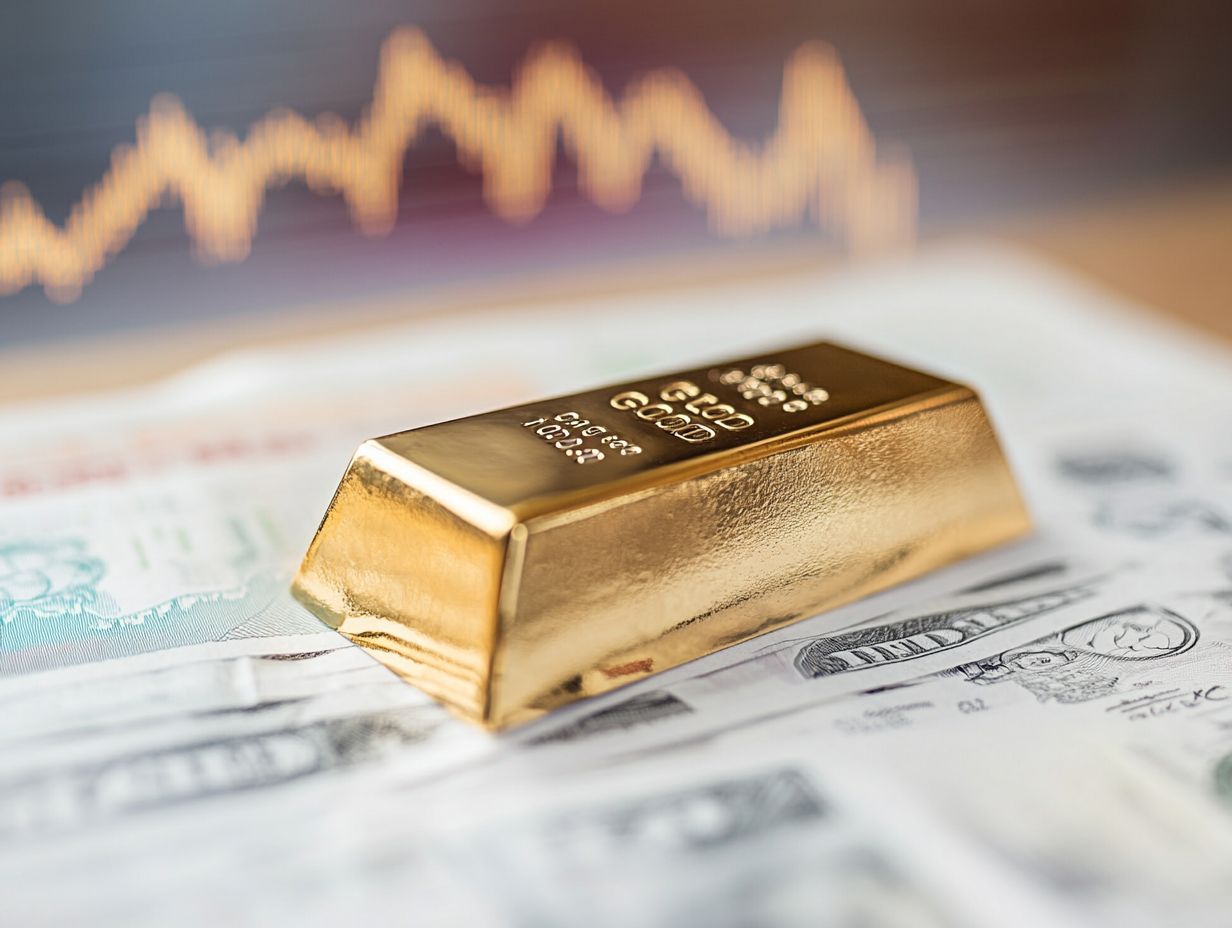Why Gold is Essential During Economic Downturns
Economic downturns often leave investors grappling with anxiety. Many seek stable and reliable investment options.
Gold is a well-known safe haven. It maintains value even during tough times. This article delves into gold’s historical significance and its vital role as a protective investment against inflation. It also illustrates how gold can effectively diversify your portfolio.
Next, we will explore how to invest in gold, equipping you with the knowledge necessary to make informed decisions during uncertain economic times.
Contents
- Key Takeaways:
- The Role of Gold in Economic Downturns
- Why Gold is a Safe Haven Investment
- Benefits of Investing in Gold during Economic Downturns
- How to Invest in Gold
- Frequently Asked Questions
- Why is gold considered essential during economic downturns?
- What makes gold a safe investment during economic downturns?
- How does gold hold its value during economic downturns?
- Why is gold considered a hedge against inflation?
- What role does gold play in a diversified investment portfolio?
- How can individuals invest in gold during an economic downturn?
Key Takeaways:

- Gold has a long history of being a valuable asset during economic downturns due to its intrinsic value and ability to withstand market fluctuations.
- Gold serves as a safe haven investment during times of economic uncertainty, providing protection against inflation and spreading your investments across different assets for added security.
- Investing in gold is not just smart; it s essential! It offers long-term stability, making it a must-have for any investment strategy during tough economic times.
The Role of Gold in Economic Downturns
Are you worried about economic downturns? Gold might be your best ally! It has long been a cornerstone for those seeking a reliable safe-haven asset, particularly in times of economic turbulence. Gold maintains its value remarkably well amidst market volatility and financial crises that can impact various asset classes.
The historical performance of gold speaks volumes. It has consistently offered wealth preservation for investors during periods of uncertainty and inflationary pressures.
Many financial experts advocate including gold in your investment strategy as a means to diversify your portfolio and protect your purchasing power against the risks posed by economic indicators that often signal impending recessions.
Historical Significance of Gold
The historical significance of gold as a financial asset is highlighted by its remarkable performance during major economic upheavals and stock market crashes, such as the Great Depression and the 2008 financial crisis.
Throughout these tumultuous periods, gold has proven its worth not only as a hedge against inflation but also as a dependable source of liquidity for investors navigating uncertainty. For instance, during the Great Depression, gold prices soared as individuals sought stability amid a plummeting stock market.
Similarly, during the 2008 crisis, experts like Bryan Routledge noted that gold’s allure dramatically intensified. Prices reached new heights as investors flocked to it for protection. Statistics show that gold appreciated approximately 25% from 2007 to 2009, further cementing its reputation as a safe haven during economic turmoil.
Why Gold is a Safe Haven Investment
Gold is recognized as a premier safe-haven investment, especially in times of market uncertainty and economic downturn. Its inherent qualities as a way to protect your money from losing value due to inflation and as a reliable source of liquidity are essential for you as an investor striving to preserve confidence in your portfolio during turbulent periods.
Factors that Make Gold a Reliable Investment

Several factors establish gold as a reliable investment for you. These include its remarkable ability to retain value, its potential to diversify your investment portfolio, and its response to shifts in economic indicators and interest rates.
Gold s unique characteristics, particularly its scarcity and low correlation with other asset classes, serve as a potent tool for effective risk management. Financial professionals consistently highlight that during periods of economic uncertainty, gold tends to hold its value, making it a safe haven for discerning investors like you.
Historical analysis reveals that in times of market downturns or geopolitical tensions, gold prices often surge. This provides a hedge against inflation and currency devaluation. Thus, incorporating gold into your investment strategy allows you to cultivate a well-rounded portfolio, balancing risk while leveraging gold s distinctive advantages.
Ready to secure your financial future? Start exploring gold investments today!
Benefits of Investing in Gold during Economic Downturns
Investing in gold during economic downturns offers you many advantages. It serves as a strong shield against inflation, helping your wealth keep its value.
It also offers a great chance to spread your investments, effectively reducing the risks that come with market ups and downs.
Protection Against Inflation
Gold acts as a strong defense against inflation, safeguarding your purchasing power during financial crises and periods of economic instability.
Historically, this precious metal has shown a close connection with inflation rates, often increasing in value as the cost of living rises. For instance, during the late 1970s, a time marked by high inflation, gold prices soared dramatically, proving its status as a safe place for investors.
From 2000 to 2020, gold consistently outperformed inflation, especially during economic downturns. When inflation rates rise, people often turn to gold as a reliable store of value, reinforcing its role in strong financial portfolios.
Diversification of Portfolio
Adding gold to your investment portfolio enhances your diversification strategy, which is crucial for effective risk management, especially in fluctuating economic conditions.
Historically, gold has shown a remarkable ability to hold its value during financial turmoil. For example, during the 2008 financial crisis, while many asset classes dropped, gold prices increased, providing a vital balance for investors.
Investing in gold can lower the ups and downs of your overall investment. This approach protects against inflation and currency devaluation, keeping your investment landscape stable even in tough times.
By looking at historical data on gold’s performance, you can truly see its role as a time-tested cornerstone for achieving a balanced asset allocation.
Long-Term Value and Stability

Gold is a shining star for long-term value and stability, making it a premier choice for preserving wealth during economic downturns.
Throughout the centuries, from ancient civilizations to modern financial markets, gold has shown itself time and again as a steadfast store of value. Its natural allure attracts not only individual investors eager to protect their savings but also central banks that count on it during times of financial uncertainty.
While many investments may struggle under pressure, gold has shown remarkable resilience, weathering countless economic storms and solidifying its reputation as a safe haven. This unwavering strength is why both private investors and institutions turn to gold, especially when facing fluctuating currencies and unpredictable geopolitical landscapes.
How to Invest in Gold
Investing in gold offers various methods, allowing you to choose the one that best fits your financial goals, liquidity needs, and overall investment strategy.
Each option has unique advantages, helping you customize your investment to match your individual objectives and preferences.
Explore your options today and secure your financial future with gold!
Different Ways to Invest in Gold
There are various ways for you to invest in gold, including purchasing physical gold, investing in Exchange-Traded Funds (ETFs), trading gold futures, and buying shares in gold mining stocks. Each method presents its own set of advantages and challenges, tailored to different investor profiles.
For example, purchasing physical gold offers the security of holding tangible assets, but it may come with storage costs and lower liquidity. On the other hand, gold ETFs provide a more liquid option, allowing you to buy and sell shares with ease, although they do carry management fees.
Trading gold futures can be lucrative, but it demands a deep understanding of market volatility and involves considerable risk. Investing in gold mining stocks can give you exposure to potential company growth, but this route also comes with its own operational risks.
Choosing the right investment method can be exciting, especially when it aligns with your financial goals!
Considerations for Choosing the Right Investment Option
When selecting the ideal investment option for gold, several key factors come into play. You will want to consider how quickly you can access your money, asset allocation strategies, and the insights of financial professionals.
Your risk tolerance is crucial in determining the appropriate level of exposure to gold, especially since its value can fluctuate due to various market conditions.
Your investment horizon, whether short-term or long-term, influences the type of gold investment you might pursue, be it physical gold, ETFs, or mining stocks.
Stay attuned to prevailing economic factors, interest rates, and geopolitical events, as these can significantly impact the gold market. Seeking professional guidance can offer you tailored strategies that align your investment choices with your personal financial goals and unique circumstances.
Frequently Asked Questions

Why is gold considered essential during economic downturns?
Gold shines as an essential asset during economic downturns, maintaining its value even when everything else falters. When traditional forms of currency, such as paper money, lose their value, gold remains a stable and reliable asset.
What makes gold a safe investment during economic downturns?
Gold is a safe investment during economic downturns because it is not subject to the same fluctuations as other investments, such as stocks or real estate. Its value is not tied to the economy or government policies, making it a stable option for protecting wealth during uncertain times.
How does gold hold its value during economic downturns?
Gold holds its value during economic downturns because of its limited supply and high demand. It is a finite resource, which means it cannot be artificially created or manipulated. Additionally, during times of economic uncertainty, the demand for gold typically increases as investors seek out safe havens for their money.
Why is gold considered a hedge against inflation?
Gold is considered a hedge against inflation because its value tends to rise as the value of paper currency decreases. As the cost of goods and services increases due to inflation, the purchasing power of paper money declines, but the value of gold remains relatively stable, making it a valuable hedge against inflation.
What role does gold play in a diversified investment portfolio?
Gold plays an important role in a diversified investment portfolio as it offers a hedge against market volatility and economic downturns. By adding gold to an investment portfolio, investors can reduce their overall risk and potentially increase their returns.
How can individuals invest in gold during an economic downturn?
Individuals can invest in gold during an economic downturn through various means, such as purchasing physical gold in the form of coins or bars, investing in gold mining stocks, or buying shares of gold exchange-traded funds (ETFs). It is recommended to consult with a financial advisor before making any investment decisions. To navigate these options wisely, consider reaching out to a financial advisor who can help you make informed decisions tailored to your circumstances.















